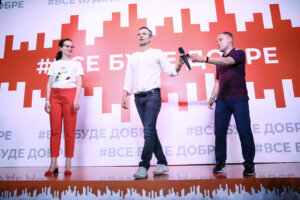When the exit poll results came in after the polls closed at 8 p.m. on July 21, Ukrainian rock star Svyatoslav Vakarchuk smiled, but didn’t look overly excited.
His Voice (Holos in Ukrainian) political party had just received 6.5 percent of the national vote, barely enough to pass the 5 percent threshold to enter parliament. Party leaders said they had expected to receive about 10 percent of the vote.
“We’ve gotten to the base camp,” Vakarchuk told journalists, comparing his party’s entry into parliament with mountaineering. “This is just the beginning.” Extending that metaphor further, Vakarchuk said that achieving “real changes” would be like conquering Everest.
Then he invited everyone to a party at his election headquarters at Kyiv’s Stereoplaza concert hall, which included DJ sets, champagne, wine, and gourmet meals.
Vakarchuk, 44, casually walked through the venue and greeted everyone he saw. The majority of people from his party list did the same. The relaxed atmosphere, with smiles and hugs, resembled a hipster co-working space.
It was, in effect, the new face of Ukrainian politics. But much old-school politicking remains ahead.

Rock star Syatoslav Vakarchuk hugs his supporter as he learns the exit poll results that his Voice political party makes it into parliament on July 21, 2019. (Oleg Petrasiuk)
Young party
Founded in May, Voice formed its party list predominantly from young business professionals and civic activists. The average age is less than 36. The party list includes no incumbent lawmakers, although there are several reform-oriented parliamentarians among the party’s candidates in single-member districts.
Like President Volodymyr Zelensky’s Servant of the People, Voice is riding a wave of dissatisfaction with the political establishment. Its political promise is to bring new faces into the Verkhovna Rada and fight for reform.
“I feel like I’m at a children’s summer camp here. I’m sorry this campaign is over,” said Oleksandra Dvoretska, 29, a civic activist and head of the Vostok-SOS group, which is helping people suffering from Russia’s war in eastern Ukraine. Occupying the 29th spot on the party list, she will not make it into parliament.
If the final results match the exit polls, the Holos party will be able to take 19 parliamentary seat through its party ticket. The party also expects to gain up to 10 lawmakers in single-member districts, said Yaroslav Zhelezniak, 29, a consultant on political governance, who is No. 4 on the party list.
Potential partners
Still, as a small parliamentary faction, Holos will need to form alliances to wield influence. The question is whether Zelensky’s Servant of the People — which will take 44 percent of the party list vote, according to the exit polls, and pick up more seats in single-member districts — will ultimately need a coalition partner to rule.
After the exit polls were published, all four of the other parties that are projected to make into parliament phoned Vakarchuk to congratulate him, said Yulia Klymenko, an economist who is No. 2 on the Voice list.
According to her, the party is ready to cooperate in parliament with any political force besides the openly pro-Kremlin Opposition Platform — For Life party, which received 11.4 percent support, according to exit polls and will receive about 33 seats by party list.
“We are happy the vector of this parliament will be pro-Ukrainian,” Klymenko said.
But she was vague about the other three potential political partners, asking to wait until the final results are in. Cooperation with each of them, however, could be tough.
Zelensky’s Servant of the People party has a lot in common with Holos. They are both young political newcomers promising swift change. But, during the presidential campaign in spring, Vakarchuk issued an appeal on social media asking people not to “vote for lols.” Many saw that as a call not to support Zelensky, a former political satirist and comic actor. Vakarchuk later said he was just calling on people to make a conscious decision.
Cooperation with former President Petro Poroshenko’s European Solidarity party would be even more challenging. Just days before the election, one of Poroshenko’s campaign workers sent out text messages sharing poll results that suggested Holos would not pass the minimum threshold to enter parliament. It encouraged voters not to waste their vote on the party. Vakarchuk then openly accused Poroshenko of a smear campaign against his party.
“These are (Poroshenko’s) principles,” Zhelezniak said. “I hope the voters will draw conclusions after that.” But, after the exit polls came out on July 21, Poroshenko called Voice his party’s main potential partner in the new parliament.
Cooperation with former Prime Minister Yulia Tymoshenko’s Batkivshchyna party would pose another challenge. Its openly populist rhetoric, which pledges to decrease utility tariffs, hardly fits the party’s liberal economic views.
Klymenko, who is vice president of the Kyiv School of Economics, said Holos is “not going to support leftist principles that will take the country nowhere.”
But Klymenko said Holos has not yet started talks about a future coalition. “We will start them from scratch,” she said.

Rock star Syatoslav Vakarchuk takes a microphone to give a speech as he learns from exit polls that his Voice party makes it into parliament following the elections on July 21, 2019.
Vakarchuk for prime minister?
During the parliamentary campaign, Vakarchuk repeatedly claimed his party had no backing from any oligarchs. On election night, he pledged the party’s first initiative in parliament would be aimed at de-monopolizing Ukraine’s economy and decreasing oligarchs’ control of the country’s media.
He also promised to make changes to the country’s notoriously corrupt justice system and initiate the lifting of parliamentary immunity from lawmakers.
Vakarchuk claimed his party was ready to take responsibility and “take any post, from the top ones down to just being volunteers.” Klymenko said Holos was ready to propose Vakarchuk as prime minister.
“I will do what the party tells me to do,” Vakarchuk said.
Speaking at his party’s headquarters on July 21, Zelensky said that Servant of the People was ready to discuss a future coalition with Voice. But he was less enthusiastic about Vakarchuk heading the government, saying he would prefer an “economic guru” for this post.
Skeptics also noted that Vakarchuk was elected to parliament in 2007, but left less than a year later, disappointed with the constant power struggles. When he cast his ballot on July 21, Vakarchuk stressed that this time he is not planning to leave early.
Vakarchuk also said he would not abandon his musical activity while in parliament. “The law doesn’t ban me from doing music, and God won’t allow me to leave it,” he said.
